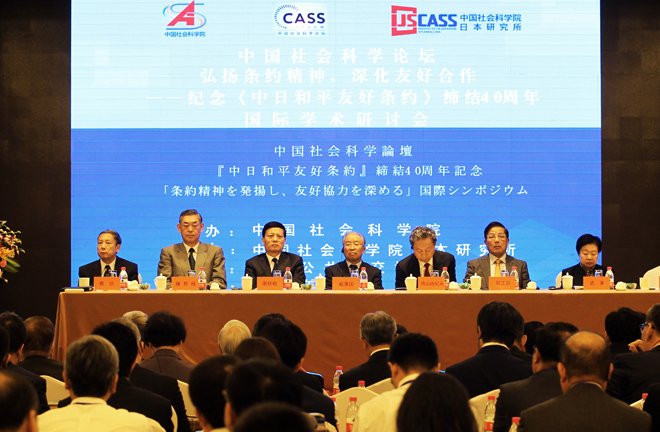Seminar commemorates signing of China-Japan treaty after 40 years

The seminar commemorates the 40th anniversary of the China-Japan Treaty of Peace and Friendship. Photo: Wu Wenkang/CSST
On Aug 11, experts made suggestions for promoting the long-term healthy and stable development of China-Japan relations at an international seminar organized by the Chinese Academy of Social Sciences (CASS), marking the passage of 40 years since the signing of the China-Japan Treaty of Peace and Friendship.
The best commemoration of the 40th anniversary of the signing of the treaty is China and Japan’s joint effort to build a new era of bilateral relations for the next four decades, said China’s former State Councilor Dai Bingguo. In accordance with pacta sunt servanda, a basic principle of international law, both countries should revisit and abide by the spirit of the treaty, effectively carry forward the essence of peaceful and friendly cooperation, ensure that the political foundation of bilateral relations is strengthened, and enable the relationship’s healthy and stable development in the long run, benefitting the people of both countries and the world, Dai suggested.
Dai said it is necessary to grasp the trend of development and change in the world situation and commit to the correct direction of China-Japan relations. In addition, both sides must grasp and share development opportunities.
CASS President Xie Fuzhan suggested creating a new situation of regional cooperation and mutual benefit by accelerating negotiations of the Regional Comprehensive Economic Partnership (RCEP) and building a multilateral cooperation mechanism. By opening up a new space for international cooperation between China and Japan under the “Belt and Road” initiative, the two countries can facilitate a community of shared future for Asia and for mankind. In addition, both countries should aim at building a new type of national relationship of cooperation and mutual benefit, and they should promote the healthy and stable development of China-Japan relations in the long term.
Former Japanese Prime Minister Yukio Hatoyama pointed out that dialogue and coordination with neighboring countries is a good way to solve problems. He suggested that the East Asian community should be built around the three countries of China, Japan and South Korea. Based on the spirit of friendship, there should be a community embracing a range of fields from economy, trade and finance to education, culture, sports, health care, environment, energy and even security. Only in this way can regional peace and development be facilitated.
Hatoyama said that Japan and China should learn from history and face the future, enhancing the friendly and cooperative relationship of mutual respect, understanding and assistance. Hatoyama expressed his appreciation of China’s “B&R” initiative. He said that China and Japan have different advantages in terms of technology and capital. There is huge space for cooperation between the two countries. He called on Japan to join the Asian Infrastructure Investment Bank as soon as possible.
For peace and friendship, China and Japan must work together to build strategic mutual trust, said former CASS Vice President Wu Yin. High-level mutual visits need to be maintained, which is an effective way to build strategic mutual trust. It is also necessary for the two countries to put themselves into each other’s place to foster accurate understanding, reduce misjudgment and enhance mutual trust. In addition, it is vital to find the greatest common denominator among the interests of both sides, so as to refine and finally form a strategic level of consensus.
The signing of the China-Japan treaty has marked a change from the historical direction of the bilateral relations over the prior 100 years, and it has had a major and far-reaching impact on the pattern of international relations in the Asia-Pacific region, said Yang Bojiang, deputy director of the Institute of Japanese Studies at CASS, who concluded that China and Japan should deepen their understanding of the spirit of the treaty and urge the relationship to return to the normal development track.
The two countries should act with superb political wisdom, said Makoto Iokibe, former president of the National Defense Academy of Japan. To build a community of shared future, China and Japan need to not only consider each other’s interests, but also consider the overall situation while contributing to human development.
Akio Takahara, dean of the Graduate School of Public Policy at the University of Tokyo in Japan, said that China and Japan should form a vision for building a future-oriented East Asian order and make frank and friendly exchanges for promoting the development of bilateral relations. In the event of a contradiction, the two countries should handle it innovatively and use skill in navigating differences.
(edited by JIANG HONG)

 PRINT
PRINT CLOSE
CLOSE